Jaipur Designer Turns Waste Paper into 100% Biodegradable, Water-Resistant Furniture
Moreover, they sell products like pouches, totes, and box bags made using paper textiles created from cotton waste.
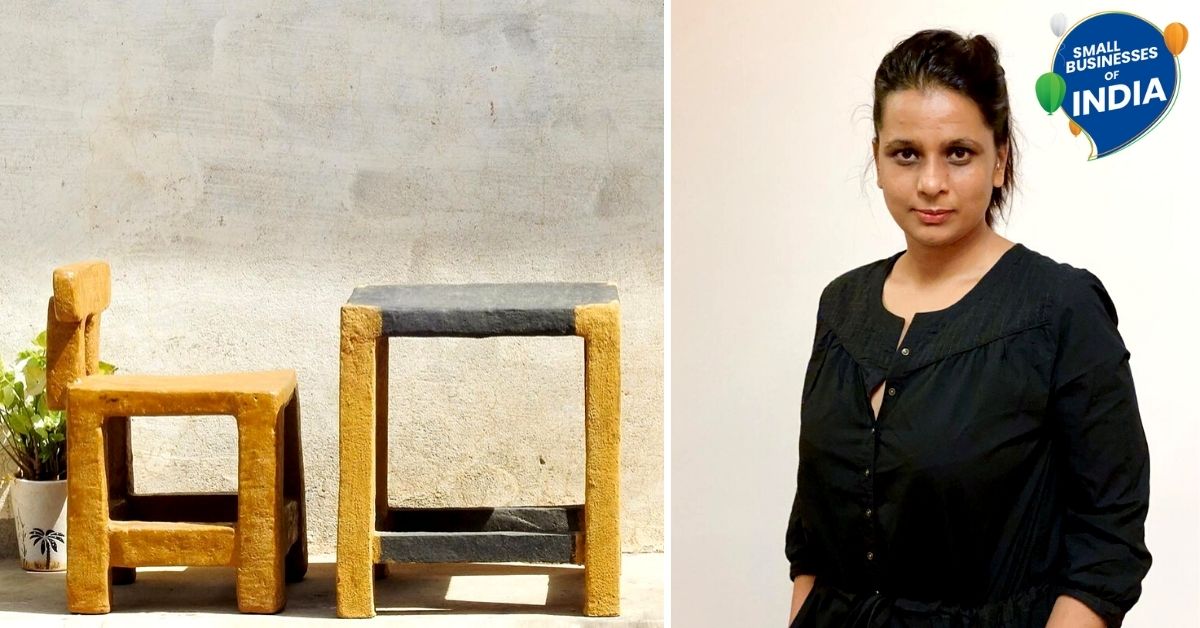
Ever since the Chinse invented the process of turning wood pulp into paper sheets, the world has been in love with this versatile product. But this process is both a great boon and a bane. Yes, we get everything from package labels to money to drawing sheets from it. But lakhs of trees are cut down every year to make paper, which can be used and tossed in ten minutes. The tree takes a lifetime to grow.
Are there any solutions?
We can do our best to reduce, of course. Recycling is a half-way solution since printed paper, with its dyes, glues and inks, makes dark and rough sheets when recycled. and cost more than fresh ones. There is reuse as well. We are certainly innovative with it in India. Street vendors wrap the goods in old notebook paper, homemakers line shelves with old newspaper and practically every home has an old paper stapled together as a writing pad. But these methods are not enough.
This is where upcycling comes in, with people like Spriha Chokhani making it interesting.
Spriha, a Jaipur-based product designer and entrepreneur, is the founder of Pulp Factory, a design studio founded in 2017 that makes products using waste paper.
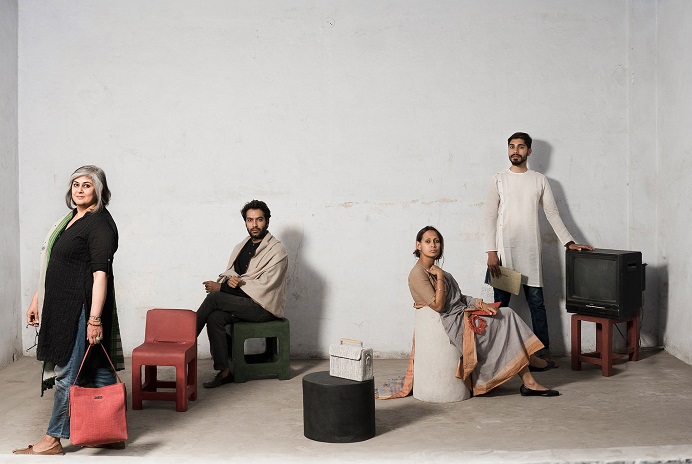
The idea of making furniture out of waste paper first came to Spriha about ten years back when she was a student at a design school. As a part of the project assigned to them, they had to either work under someone or carry out independent work.
“We were supposed to work with materials and I started noticing that a lot of people were working bamboo or cane. While this helped in developing more products, materials like papier mache were heavily ignored. Other than a few souvenirs from Bihar and Kashmir, this material was hardly ever explored. This is what got me really curious,” says the 32-year-old, speaking to The Better India.
She came up with a range of papier-mache furniture, which is 100 per cent compostable. The six different styles of furniture that they have can withstand the weight upto 80-100 kg. Moreover, these are water-resistant and made using natural materials. Today she sells the same, along with pouches, totes, and box bags made using paper textiles, under her label – Pulp Factory.

Experimenting with Materials
Brought up in Assam, Spriha moved to Bengaluru to pursue a degree in Product Design from the Srishti Institute of Art, Design, and Technology.
After deciding to use papier mache as her material of choice for her three-month-long diploma project, a long period of experimentation followed.
“Initially, when I was making the furniture, I was using strong adhesives made with chemicals. That had a negative impact on my health. I began questioning myself about what is the point of making a product if it isn’t maker-friendly. That is when I decided to look out for natural materials that ensure the wellbeing of whoever was making the furniture,” she says.
Spriha then started experimenting with materials like corn starch, potato starch and even rice. Finally, she settled on tapioca glue but realised that it would, unfortunately, leave an odd smell. By this time, she had finished her course and decided to take a break to dabble in pottery.
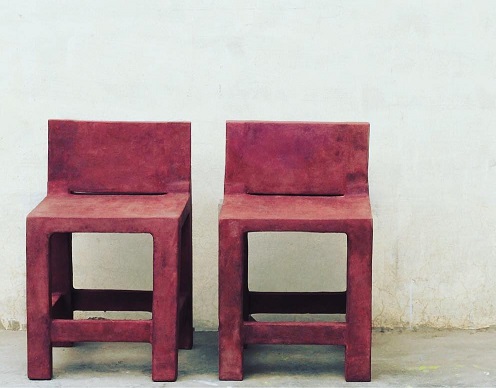
The thought of Pulp Factory (a name she coined in 2010 itself) never left her as she could envision the potential that the idea had. In 2012, she led Pulp Factory into its first exhibition with products made with a mixture of odour-free natural glues.
In 2014, she showcased these products at the India Design week in Delhi.
Spriha moved to Jaipur the next year to conduct research on different kinds of paper. Having done her schooling in Jaipur, the pink city was familiar to her. In 2017, Bharat Chokhani, her cousin joined her as a partner and Pulp Factory was registered.
Going about the Operations
“Our studio is like a one-stop destination where we extensively work with paper in different ways with a sustainable approach,” says Spriha. The operations for Pulp Factory are carried out at a small bungalow close to her residence in Jaipur. The core team consists of just five people.
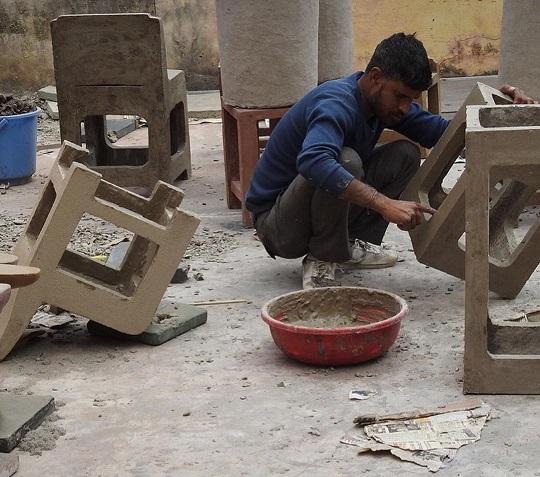
A master weaver weaves the paper yarn into paper fabric and another team member crafts paper products like the bags. The furniture is handcrafted by Spriha and another employee, who sits on the terrace every day since it requires ample sun.
The most important raw material for this is the waste paper (mostly newspaper) pulp which is sourced from the neighbourhood kabadiwalas. Each piece of furniture is upcycled from at least five to eight kg of waste paper and takes almost 25 days to be ready.
“I think the most interesting aspect of the operations is how the furniture is made. We have ensured that the waste generated during the process is a bare minimum while also ensuring the wellbeing of the person crafting the furniture,” she says. Even for packaging, Spriha informs that they use agricultural waste to make small cushions, which are used as padding.
These sustainable values and unique products have drawn the attention of customers.
Richa Siotia, for example, first discovered Pulp Factory over three years ago at the India Design Fair. She was surprised to see that furniture made by upcycling waste paper could be so sturdy.
“Later, I decided to purchase two blue coloured stools that were made by them. The best part is they are sturdy, long-lasting and add a unique touch to the living space. I even take it out on the balcony once in a while. I have also checked out their other paper products like bags which are beautiful. I love the work they are doing and if you want to get into sustainable living, it is a good point to start from,” says the Delhi-based entrepreneur.
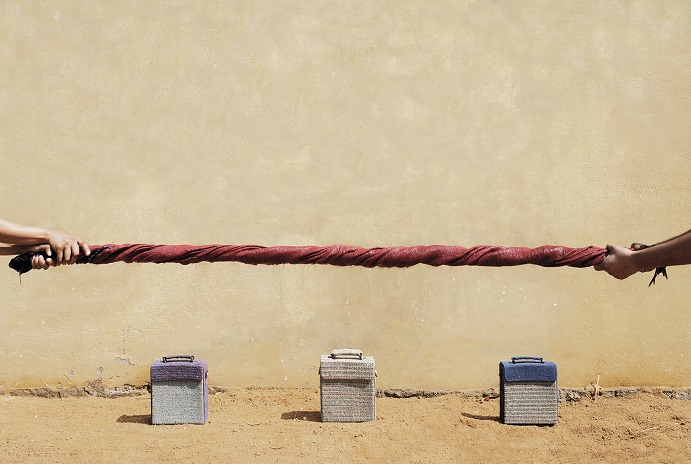
Another customer, Kolkata-based Neha Agarwal, first discovered the Pulp Factory while browsing through her Instagram feed last year. “When I first saw the pictures, I couldn’t even believe that furniture can be made from paper,” says the 32-year-old graphic designer.
She then began looking at all the products and settled on a bag made from paper fabric.
“I use the bag from Pulp Factory daily. It is very durable and can carry anything that I dump inside. I also love the fact that it is 100 per cent biodegradable. Even their packaging is completely sustainable and I appreciate their conscious efforts,” she says.
Overcoming hurdles and looking ahead
The journey towards establishing her own venture has not been easy and Spriha discusses a few challenges that she has faced in her entrepreneurial journey.
“Working as a woman can be really hard. People don’t take you seriously and one really has to hold their ground to put forth their ideas,” she explains.

Other than that, she adds that it is often difficult to explain to people that the furniture handcrafted from papier mache actually works. But, she quickly adds that with an increase in eco-consciousness and the buzz around it on social media, explaining the concept is easier now.
Spriha has a few words of encouragement for other small business owners.
“I think if you are in a field like this, one needs to have an extreme amount of patience. Just believe in your idea and keep pushing it. It is an evolving process. Don’t rush things, keep evolving, and be open to learning,” she says.
Now, Spriha informs that they are experimenting with making newer accessories with the paper fabric. She also wants to increase the pace of production while also working closely with schools and other institutions where she hopes the sustainable furniture can be installed one day.
“I want people to understand that sustainability is not a trend or a fad but a way of living. It is a holistic way of looking at things where nothing is left behind,” she says.
Rapid-fire:
*An entrepreneur/designer you admire.
Ans: Wendell Castle, a leading American furniture artist
*New tech that can transform the future of small businesses
Ans: Tech developed to harness the use of bio-materials
*One value that can help small businesses thrive
Ans: A team that is open and communicates
*Your favourite book
Ans: Radical Matter: Rethinking Materials for a sustainable future by Caroline Till and Kate Franklin
*In my free time, I ____…
Ans: Daydream, listen to music and take it easy
* Before this interview, I was ____…
Ans: I was at a product shoot
* A message for your past self about small businesses
Ans: Success and failure are equally important in one’s journey
*Best advice you ever got is ____…
Ans: The higher we go up, the humbler we should become
(Edited by Saiqua Sultan)
Like this story? Or have something to share?
Write to us: [email protected]
Connect with us on Facebook and Twitter.

Similar Story

Startup’s Innovation Could Help Millions Get Access to Better Brain Health At Home
Ivory, a pioneering age-tech startup founded by Issac John and Rahul Krishnan, aims to redefine the ageing experience by focusing on better brain health, through neuroscience-backed assessments, interactive games, and personalised solutions.
Read more >
If you found our stories insightful, informative, or even just enjoyable, we invite you to consider making a voluntary payment to support the work we do at The Better India. Your contribution helps us continue producing quality content that educates, inspires, and drives positive change.
Choose one of the payment options below for your contribution-
By paying for the stories you value, you directly contribute to sustaining our efforts focused on making a difference in the world. Together, let's ensure that impactful stories continue to be told and shared, enriching lives and communities alike.
Thank you for your support. Here are some frequently asked questions you might find helpful to know why you are contributing?


This story made me
-
97
-
121
-
89
-
167












